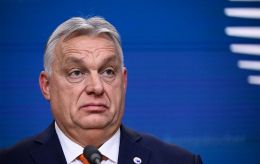White House declines to comment on WSJ article linking Ukraine to Nord Stream sabotage
 Illustrative photo (Getty Images)
Illustrative photo (Getty Images)
The White House declined to comment on The Wall Street Journal’s report that Ukrainian high-ranking officials might have "approved" the operation to blow up the Russian gas pipelines in the Nord Streams, citing John Kirby, the National Security Communications Advisor.
He declined to answer reporters' questions asking him to comment on the article.
"I’m not going to comment on the Wall Street Journal reporting on this," Kirby responded during the press conference in Washington.
Background
Two days ago, on August 14, it was reported that Germany had issued an arrest warrant in Poland for a Ukrainian diver suspected of involvement in the Nord Stream and Nord Stream 2 pipeline explosions. Later, there was information suggesting he might have left Poland for Ukraine.
On August 15, The Wall Street Journal reported that Ukrainian high-ranking officials were allegedly involved in the explosions.
Mykhailo Podolyak, advisor to the President’s Office, denied Ukraine’s involvement in the operation in a comment to Reuters. He reminded that there was sufficient evidence of Russia’s involvement in the explosions.
It is worth noting that Scandinavian countries had repeatedly reported that Russia conducted reconnaissance in the Baltic Sea before and long before the explosions.
Swedish Prime Minister Ulf Kristersson also mentioned that the investigation into the pipeline explosions had been definitively closed.
Nord Streams
Nord Stream 1 and Nord Stream 2 were built by Russian Gazprom. They were intended to transport up to 110 billion cubic meters of natural gas per year to Germany.
Nord Stream 2 was never put into operation due to Russia's full-scale invasion of Ukraine, and Nord Stream 1 was stopped by Gazprom itself in the summer of 2022.
However, on September 26, 2022, three of the four pipeline branches were blown up. Sweden conducted an official investigation, as the explosions occurred within its maritime economic zone. Denmark also investigated the incident.
Investigations revealed that despite Russia’s occupation of Ukrainian territory in 2014, Germany continued to promote the construction of the Russian project.
The official investigation has been closed, but its results have not yet been released. Most experts still lean toward a Russian connection in this incident.


